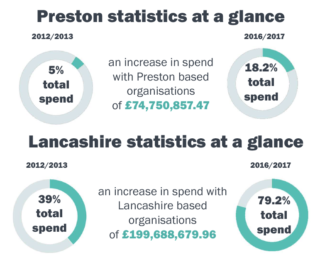Community Wealth Building: harnessing the potential of anchor institutions in Preston
Anchor institutions bring wealth in the form of jobs and supply chains; they are rooted in place and as such are vital to the functioning of our local economies. In Preston, anchor institutions have started to realise their potential and make significant contributions to wider local economic development, as our latest spend analysis illustrates.
Over the last six years, CLES and Preston City Council have been working together to harness the potential spending power of seven local anchor institutions: Preston City Council, Lancashire County Council, Preston’s College, the University of Central Lancashire, Cardinal Newman College, Lancashire Constabulary, and Community Gateway. In our work we have sought to collectively change cultures and behaviours so that greater economic, social and environmental benefit is derived for the Preston economy and its residents.
Addressing local leakage
In 2012, we started looking at the process of procurement and particularly the extent to which the anchor institutions utilised local organisations in their supply chain. Our baseline analysis found that only 5% of total spend was with local suppliers, with over £450million of procurement spend leaking out of the Lancashire economy.
Since the baseline analysis, there has been a rethink in the way that the anchor institutions undertake procurement. A collective vision and means of enabling maximum benefit through procurement have been developed, and CLES has worked with organisations to target their ‘influenceable spend’ (on goods and services that are not subject to long-term contracts, tied to framework agreements, and are not specialist). We have also developed an understanding of the local business base and raised awareness of potential opportunities to become suppliers.
CLES has conducted spend analysis for the 2016/17 financial year and this has shown that the Community Wealth Building activities have generated positive impacts locally. Despite a reduction in collective procurement spend of £130million compared with the baseline analysis, the anchors in Preston now contribute more to the local economy:

Whilst repatriating spend is important, a greater success has been to shift the behaviour of the anchor institutions so that they think more progressively about their procurement practice and consider the impacts it can have for the local economy and local people. Examples here include: Lancashire County Council has revisited its commissioning and procurement strategies and has broken contracts into lots to enable smaller organisations to be supported to bid. Lancashire Constabulary now requires quotes from local organisations on procurement opportunities between £10k and £50k.
Enhancing the impact of Community Wealth Building
Despite the positive impact of the Community Wealth Building activities so far, CLES has made six recommendations to enhance impact:
- Explore influenceable spend in more depth – engage with local businesses at the pre-procurement stage
- Explore cooperative development – with a focus on sectors where there is significant spend with non-regional suppliers and where there is not a diversity of local businesses
- Engage more proactively with SMEs
- Continue to measure spend – spend analysis should be embedded into the procurement practices of anchor institutions so that it can be repeated on an annual basis
- Take procurement practice and analysis of impact to the next level – common social outcomes should be developed and considered when designing goods and services; procurers need to ask and score suppliers at the tender stage on how they will contribute to these outcomes; and delivery of social outcomes should be embedded into contracts and their delivery monitored
- Evidence the value of other Community Wealth Building initiatives
Our work with Preston City Council in Preston has shown that anchor institutions can make significant contributions to the local economy. The challenge now is for more places to adopt a Community Wealth Building approach and to harness the untapped potential of anchor instructions at scale.
Read more
Michael Sheen, John McDonnell and Neil McInroy discuss The Preston Model
https://cles.org.uk/our-work/publications/community-wealth-building-through-anchor-institutions/


